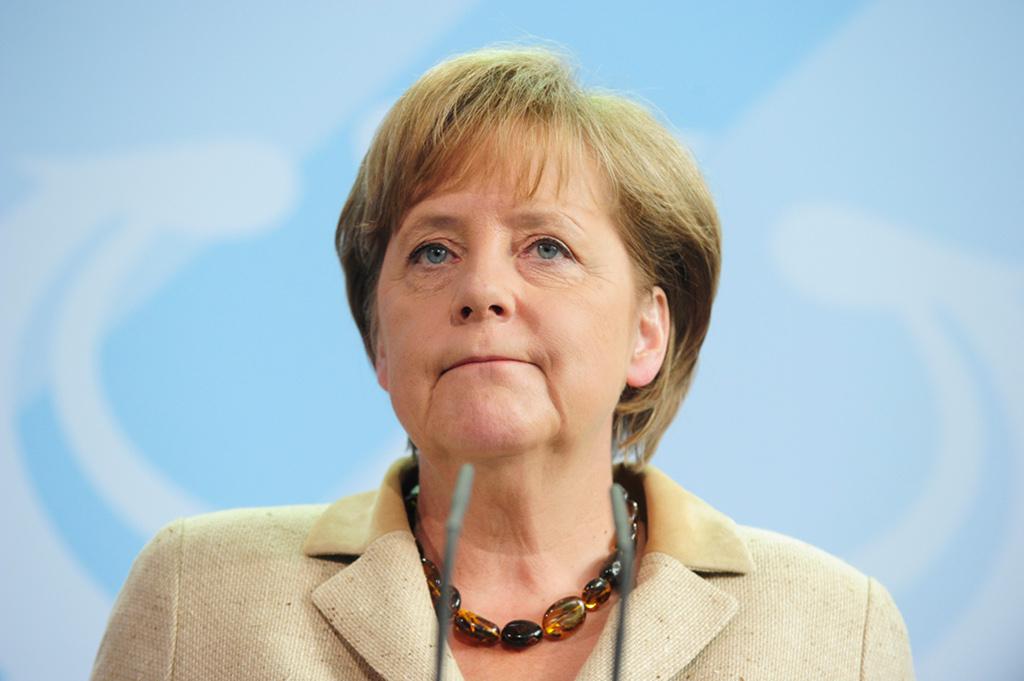Merkel gets tough
German Chancellor Angela Merkel addresses a press conference at the chancellery in Berlin on May 2, 2011. The killing of Al-Qaeda leader Osama bin Laden is a ‘victory for the forces of peace,’ but his death does not mean extremism has been defeated, Merkel said.
Top news: Chancellor Angela Merkel, already facing disgruntled voters at home, can now add some neighboring countries to her list of antagonists. Merkel’s success in pushing through European Union bailout reforms came at the expense of the goodwill of some EU members.
Merkel and French President Nicolas Sarkozy insisted on a new framework for helping ailing eurozone countries whose collapse could threaten the common currency, and financial penalties for fiscally irresponsible EU members.
The deal was unpopular as it will require changes to the Lisbon Treaty, which only came into effect last year. Merkel and Sarkozy were accused of bullying by some bruised neighbors. Greek leftists evidently don’t think much of her either: Police suspect they are responsible for a parcel bomb sent to Merkel’s office.
The bomb was disabled before it exploded. Merkel had demanded tough austerity measures from Greece at the height of its debt crisis.
Merkel also threw gasoline on an already flammable immigration debate in Germany by declaring that multiculturalism had “utterly failed.”
Leaving aside Merkel’s desperate need to shore up conservative support to boost her flagging poll numbers, most commentators agree Germany does need an immigration debate. Half a century after it started receiving “guest workers” to fill labor shortages, many Germans still see immigrants and their children as temporary residents rather than fellow citizens.
The question is whether the debate will be constructive or poisonous. Some contributions haven’t been entirely helpful: Bavarian conservative Premier Horst Seehofer, for instance, floated the idea of stopping all immigration of Turks and Arabs.
Germany discovered it will bid farewell to the roughly 20,000 British troops still based on its soil sooner than it expected. As part of Britain’s tough defense cuts, all of its bases in Germany will be closed by 2020, not 2035 as previously expected.
As well as marking the end of an era, the withdrawal raises the question: Amid pressure to make its own cuts, what will the U.S. Defense Department do with the 50,000 troops it has stationed in Germany?
There were two new chapters written in the long tale of Germany’s self-reflection, with the German Historical Museumholding the country’s first exhibition focusing directly on Adolf Hitler. The display of Nazi symbols and Hitler minutiae taps into Germany’s fascination with — and willing elevation of — Der Fuehrer.
Historians, meanwhile, released a major study revealing the extent of the German ForeignMinistry’s participation in the Holocaust— and its obfuscation in the years that followed.
The panel of historians, commissioned in 2005 by then-Foreign Minister Joschka Fischer, found that the ministry did not resist the Nazis, as has always been claimed. Rather it actively helped in the extermination of millions of Jews, Roma, gays and other victims in Nazi death camps.
Fischer said of the report: “It makes me feel sick.”
Money: Germany’s economy may be booming, but government and business are getting jittery about U.S. monetary policy and Chinese sabre-rattling over its essential rare earth metal exports.
Economy minister Rainer Bruederle slammed plans by the Fed to buy up to $2 trillion of U.S. Treasury bonds as “indirect manipulation of an exchange rate.” Germany is worried that a weaker dollar —on top of a weaker Chinese yuan — will hit German exports.
Meanwhile, Bruederle called on German companies to form a commodities syndicate as a counterweight to China’s virtual monopoly on rare earth metals. Rare earths are essential in high-tech manufacturing, which is Germany’s bread and butter. Bruederle and several major German firms expressed alarm when China announced, with silken menace, that it was cutting its exports of the metals.
And while it may have a 21st century economy, Germany’s gender attitudes are anything but modern. A study found that women earn 8 percent less money than men for the same work with the same qualifications and 23 percent less per hour than men on average.
Elsewhere: In an age of terrorism, global warming and economic calamity, the death of a common octopus might reasonably be expected to pass unnoticed. But when the octopus has gained fame for correctly “predicting” a string of results in World Cup soccer matches, reason is nowhere to be found.
Paul, the eight-legged oracle with an apparent knack for picking winning soccer teams, was found dead in his tank at the Sea Life center in Oberhausen, western Germany. Aquarium staff, according to the statement, were “devastated.”
His death quickly spawned a string of conspiracy theories around the world — most of them tongue in cheek, one hopes, though it was sometimes hard to tell. The aquarium itself, in true Teutonic style, announced without an ounce of self-mockery it would pursue “the most appropriate course of action” and erect a shrine in Paul’s memory.
Every day, reporters and producers at The World are hard at work bringing you human-centered news from across the globe. But we can’t do it without you. We need your support to ensure we can continue this work for another year.
Make a gift today, and you’ll help us unlock a matching gift of $67,000!
